California has one of the largest economies in the world. So what would happen if it broke away from the United States? Could California ever go independent? And if it did, what would that look like?
This is a future that’s been on my list for a while, but since the election here in the United States it’s taken a bit of a different tone. California voted overwhelmingly for Hillary Clinton in the presidential election, 66 percent of the state cast their votes for her. And as most of you probably know, she did not win. And this is one of the big talking points of many California secessionists. The presidential election is almost alway totally decided before California’s polls even close. So why should California continue to be ruled by a government that it basically doesn’t elect? And, they argue, that doesn’t really have their best interests at heart.
To help figure out what this future might be like, I talked to:
- Peter Laufer, a journalist and the author of a book called The Elusive State of Jefferson.
- Jon Christensen, a professor at the Institute of the Environment and Sustainability and the Department of History at UCLA. He’s also the editor of a quarterly magazine about California called Boom.
- Jay Rooney, the press secretary for the California National Party.
- Richard Monette, a professor of law at the University of Wisconsin and the director of the Great Lakes Indian Law Center.
If you want to learn more about the various California independence movements, here are some links.
- The California National Party
- Yes, California Independence Campaign
- Secession, the American Civil War
- Calexit? Brexit Buoys California Independence Movement
- Active separatists movements in North America
- Republic of Lakotah
- One in four Americans want their state to secede from the U.S., but why?
- Americans for Independence, in America
Flash Forward is produced by me, Rose Eveleth. The intro music is by Asura and the outtro music is by Hussalonia. Special thanks this week to Sameer Ajmani, Jade Davis, Brent Rose, Jim Basili, Caroline Sinders and Scott Musgrove. The episode art is by Matt Lubchansky.
If you want to suggest a future we should take on, send us a note on Twitter, Facebook or by email at info@flashforwardpod.com. We love hearing your ideas! And if you think you’ve spotted one of the little references I’ve hidden in the episode, email us there too. If you’re right, I’ll send you something cool.
And if you want to support the show, there are a few ways you can do that too! We have a Patreon page, where you can donate to the show. But if that’s not in the cards for you, you can head to iTunes and leave us a nice review or just tell your friends about us. Those things really do help.
▹▹▹▹▹▹▹▹▹▹▹▹▹▹▹▹▹▹▹▹▹▹▹▹▹▹▹▹▹▹▹▹▹▹▹▹▹▹▹▹▹▹▹▹▹▹▹▹▹▹▹▹▹▹▹▹▹▹▹▹▹▹▹▹▹▹
TRANSCRIPT
Rose: Hello and welcome to Flash Forward! I’m Rose, and I’m your host. Flash Forward is a podcast about the future! Here’s how it works — every episode we take on a possible future and try to really over think how it would actually work. First, we take a trip to the future to hear some scenes from the future, then we teleport back to today to talk to real life experts about what they think that future would be like. Got it? Great, we’re not going to go to the future just yet.
FIRST! I want to tell you about another podcast I really like. It’s a real one, not a fake future one, and it’s called Science Vs.
(Normally I don’t include ads in the transcripts here but if you don’t already know about/listen to Science VS, check it out! https://gimletmedia.com/science-vs/)
Okay now we’re going to go to the future! And this episode, we’re going to start in the year 2036.
TRANSCRIPT
[crowd noise, shuffling]
[ping]
Border Guard: Hello, welcome to California. Where are you coming from?
Passenger: Washington D.C.
Border Guard: And where are you staying?
Passenger: At the Millennium Biltmore
Border Guard: Business or pleasure?
Passenger: Business, I’m here for a conference.
Border Guard: Do you have a work visa in California?
Passenger: I’m sorry?
Border Guard: Do you have a work visa in California?
Passenger: Uh, no, I didn’t… I didn’t realize I needed one? I’m just coming for a conference.
Border Guard: How long are you staying?
Passenger: Just for the weekend, I leave Sunday night.
Border Guard: Okay, in the future any business trips over three days require a work visa in California.
[stamp noise]
Border Guard: Enjoy your stay.
President of California: My citizens. It has been a long road, our path to independence. And it will be a long road ahead of us. We must undo so many of the thing the United States did to cripple our economy, our environment, and our education systems. But we have taken the first step. Together, we have emerged from the rubble of our neighbors with our true Californian spirit unbroken. And we are ready to take on the next day, free of those 49 other states, free of their baggage and politicians and infighting. Today is a new day, today is our day, long live California!
[cheers]
[kids]
I pledge allegiance, to the flag, of the Independent State of California. On my honor, I will be faithful and bear true allegiance to my country and my people. I will be a true Californian in thought, in word, and in deed.
Rose: So this episode is all about a future where California leads the West in a successful secession movement. This is a future that’s been on my list for a while, but since the election here in the United States it’s taken a bit of a different tone.
California voted overwhelmingly for Hillary Clinton in the presidential election last year, 66 percent of the people who voted in California, cast their votes for her. And as most of you probably know, she did not win. And this is one of the big talking points of many California secessionists. The presidential election is almost alway totally decided before California’s votes are even counted. So why should California continue to be ruled by a government that it basically doesn’t elect? And, they argue, that doesn’t really have their best interests at heart.
Of course, California isn’t the only state that doesn’t always get its way, right? That’s kind of the whole thing about having fifty states, not every state is going to get the elected official that they want. A lot of conservative states can make the same claims that California does, they almost always vote republican but they don’t always get a republican president.
But I want to back up a little bit, because secessionist ideas are about as old as America itself. So before we go into the future, let’s go back to the past. There are a ton of interesting secessionist movements to pull from, from history. But I’m just going to pick one, and it’s my favorite one and it’s a place called Jefferson.
On November 27th, 1941, motorists driving down Interstate 99 just south of Yreka, California were stopped by mountain men with guns. These guys were handing out a “Proclamation of Independence.” Which read:
You are now entering Jefferson, the 49th State of the Union.
Jefferson is now in patriotic rebellion against the States of California and Oregon.
This State has seceded from California and Oregon this Thursday, November 27, 1941.
Patriotic Jeffersonians intend to secede each Thursday until further notice.
For the next hundred miles as you drive along Highway 99, you are travelling parallel to the greatest copper belt in the Far West, seventy-five miles west of here.
The United States government needs this vital mineral. But gross neglect by California and Oregon deprives us of necessary roads to bring out the copper ore.
If you don’t believe this, drive down the Klamath River highway and see for yourself. Take your chains, shovel and dynamite.
Until California and Oregon build a road into the copper country, Jefferson, as a defense-minded State, will be forced to rebel each Thursday and act as a separate State.
(Please carry this proclamation with you and pass them out on your way.)
Peter Laufer: It made, of course, for a terrific story with with these old late forties automobiles being stopped by guys with long guns and cowboy hats
Rose: That’s Peter Laufer, a journalist and the author of a book called The Elusive State of Jefferson.
The story of this armed interception spread like wildfire, which was kind of the point. The whole movement for the independence of Jefferson was run by two guys. The first was a man named Gilbert Gable.
Peter: The mayor of Port Orford, Oregon where he had landed looking to make something of himself besides the work he had done back on the East Coast as a P.R. specialist
Rose: And the other, was a journalist named Stanton Delaplane.
Peter: A fanciful reporter for a fanciful newspaper at the time, the San Francisco Chronicle.
Rose: Gable wanted to bring attention to what he saw as a grave injustice.
Peter: Port Orford, and others in southern Oregon and Northern California, were trying to draw attention to their rural plights being disregarded by urban centers
Rose: And Delaplane was looking for a story.
Peter: Stanton Delaplane, the reporter for The Chronicle saw an opportunity for a story that would not only be fun to report, and he expected fun for his readers, but also a distraction from the kinds of stories that were filling the front pages as the world headed for the second world war
Rose: So, they teamed up.
Peter: So Delaplane went up into the boondocks of Northern California and Southern Oregon and wrote a series of reports that were splashed all over the paper.
Rose: Delaplane actually won a Pulitzer for his reporting on the Jefferson independence movement. But Laufer doesn’t think that the Pulitzer committee quite realized how involved Delaplane was in, kind of creating a lot of the stuff he was writing about.
Peter: He was heavily involved in what we could call today, perhaps on the positive side, participatory journalism, or the White House might call fake news. He engaged his subjects and helped them generate what it is they were up to and what it is they were saying.
Rose: But either way, the nation was bemused and fascinated by these reports of Jefferson. A rural community pushing back against what they saw as an unfair prioritization of the urban parts of their state.
Peter: And this was, all indications are, largely imagined by reporter Delaplane and acted out by the locals who were anxious to engage in some frivolity, and some frivolity that would draw attention to their legitimate gripes against Salem and Sacramento
Rose: Which sounds kind of familiar, right? That urban/rural divide is something we’re still talking about today in America.
And even though this really was a PR stunt, Jefferson even went so far as to appoint a leader. On December 4th, 1941, a guy named John Leon Childs was inaugurated as the first governor of the State of Jefferson.
Unfortunately, that was kind of the last the success for Jefferson. Two days before Childs was sworn in, Gilbert Gable actually died. And three days after Childs was sworn in, on December 7th, 1941, something happened that completely ended the movement.
Peter: Yeah, it was very simple. The Japanese attacked Pearl Harbor and suddenly a bunch of rogues drawing attention to themselves and their legitimate problems out in the wild west of Northern California and Southern Oregon no longer was germane to anybody’s priorities, including their own.
Rose: Now, today, there is obviously no State of Jefferson, but the idea hasn’t died. In fact, if you’re driving through that same region of the 99 where the men with long guns and cowboy boots stopped cars in 1941, you might catch the local radio station, Jefferson Public Radio. http://ijpr.org/state-jefferson
[[SAMPLE]]
IJPR-1: Welcome to “As It Was”, tales from the mythical state of Jefferson.
IJPR-2: I mean, after all, this is Jefferson Public Radio
IJPR-3: Nick, welcome to the Jefferson excach.
Rose: Jefferson is more of a state of mind, it’s actually something you can get on a bumper sticker. It’s not really a movement these days.. In fact, most of these movements seem largely created to draw attention to a perceived injustice, rather than to actually break a region or state away from the rest of America.
In 2009, the governor of Texas, Rick Perry, said that seceding from the United States was on the table if the federal government kept ignoring the desires of his state. But really, that was largely meant to posture, to remind the U.S. how valuable Texas is. I feel very confident saying that Rick Perry, who then went on to run for president of the United States, would never really lead Texas in a charge to break away from those United States.. But he was happy to vaguely threaten that, to draw attention to his state’s issues.
And so are many states. Alaska, New Hampshire, Hawaii, Vermont, they all have active secessionist groups. And according to a Reuters poll in 2014, one in four Americans thinks their state should secede.
But there’s something about California that seems to really breed these movements. And that too, has historical underpinnings.
Jon Christensen: That’s you know on the old maps of the New World, from the 16th and 17th then even into the 18th century, California was often depicted as an island.
Rose: That’s Jon Christensen, a professor at the Institute of the Environment and Sustainability and the Department of History at UCLA. He’s also the editor of a quarterly magazine about California called Boom.
Jon: It was imagined as an island because California was first part of the Pacific world before it was part of the United States, and California was largely settled not as we imagined by people coming from the east, but it was settled from the west, from the Pacific Ocean and from the south from Mexico, and then from the north as well with some Russian settlements. And so California has always been a place apart and in many ways an island.
Rose: And California has some compelling arguments for wanting to leave the United States. Its economy is gargantuan compared to every other state. California has more people than all of Canada. It has access to the sea for trade, it has fertile farmland, and it has plenty of energy options.
And the folks behind Californian Independence say that California is simply giving way more to the U.S. than it’s getting.
And Jon admits that, as a Californian himself, the idea of an independent California is pretty appealing.
Jon: California’s identity as a place apart has a long standing history and a vibrant salience today. Sometimes we imagine ourselves as the future that the United States will become and sometimes we imagine ourselves just as different and separate. California is a force in the world. You know the estimates vary and it depends on how you count the numbers, but if we were an independent nation we’d be somewhere around the sixth or seventh largest economy in the world.
There are lots of facts as well as appealing ideas that make the make the idea of secession appealing as a thought experiment.
Rose: But when it comes to taking this whole thing from an idea, to an actual movement. That’s where kind of Jon backs away.
Jon: I think the people who are pushing for secession; and I know some of them, they’ve asked me to get involved with their campaign, and I’ve politely demurred. It’s not something that I’m going to actively campaign against, although I think that the idea is cracked. I think it’s fundamentally cracked, I think it’s appealing but I think it’s a waste of time.
Rose: And everybody I talked to for this episode reminded me that we have, in fact, seen one other secessionist movement really happen in the United States before. It started in 1861.
Jon: The last time that was tried it was arguably the the biggest disaster in the history of the United States with the civil war.
Rose: The Civil War! You’ve probably heard of it. Over a million people died fighting in the Civil War. And, the states that tried to break away… lost.
Now, Jon says that the people of California have the right to rise up if they truly believe that being part of the United States is oppressive.
Jon: What is contemplated in American history and in the in the Constitution is not secession but revolution. If California believes that the that being part of the United States is untenable and we are not being governed well and it is oppressive, we do have the right as people to revolt and have a revolution.
Rose: But when it comes down to actually picking up arms and fighting to leave the union, Jon isn’t so sure that the folks pushing seccession are quite willing to do that.
Jon: I don’t think that the the the United States would look favorably upon a real revolution in California, and I don’t think most Californians would either if they thought seriously about what the consequences of that would be.
Rose: When we come back, we’re going to find out what the folks at a Californian National Party, one of the groups pushing for independence, think about all this. Are they willing to take up arms to leave the US? And if they are… what does that future look like? You can find out, after a quick word for our sponsors.
[[AD]]
Rose: So we’ve walked through some of the past secession movements, and how they went down. But what about the future, isn’t this podcast supposed to be about the future? It is! And now we’re going there. Let’s talk about a future in which California actually tries to secede from the United States.
The first thing I learned is that at least one of the California Independence groups wants me to stop using that word. Secede.
Jay Rooney: Well I will say first of all that we don’t like to use the word succeed because it just conjures up a lot of ugly historical imagery of civil wars, and belligerent secession movements, and failed separatist movements. That’s really not what we’re going for, or how we see it.
Rose: This is Jay Rooney, he’s the press secretary for the California National Party.
Jay: The California National Party Started early 2015. A group of like minded individuals got together and thought, you know this independence thing is a good idea, how can we make this happen? Then the party first held its first convention in the summer of 2016, where the current leadership was elected and then another convention that September when we adopted our platform. And we’ve been going strong ever since. Certainly the election has given us a great boost, as you can imagine.
Rose: And Jay says that, despite historical precedent, he doesn’t think that California breaking a way necessarily has to include a very bloody, terrible war.
Jay: So about the Civil War;’ basically the reason there was a civil war then, and we don’t believe there will be a civil war now, because the world is a much much different place now than it was in the 1860s. So for example, the U.N. charter lists political self-determination as a human right. So as a result that’s something that no government can deny.
America declaring war on California after a peaceful and democratic vote in favor of independence would not only violate their treaty obligations to NATO, the U.N. and more, but it would also crash the global economy. Doing so would be no one’s best interest, and I find it really hard to believe that the U.S. government, even under a Trump administration, would be so foolhardy. So we plan to win independence through the ballot box.
Rose: So here is their plan. First, become an officially recognized party. Then, start running candidates on the CNP platform — first local stuff, then regional, then state wide. Then, once CNP party members are elected to a ton of offices in California, they run a ballot referendum asking the people of California, “Hey, do you want to leave the US?”. And if that passes,
Jay: then our elected officials will begin the process of a negotiated exit with the United States.
Rose: And this is the part that I think a lot of people have questions about, myself included. So the idea here is that Californians vote to become independent. And then California, a state that brings in two and a half TRILLION dollars every year to the US, simply goes and tells the federal government that it would liek to leave. And the federal government says… yes? Why would they say yes? Part of the platform for independence is that California puts more into the United States than it gets out.
Jay: And for every one dollar that Californians pay in federal taxes we only get like 78 cents to 98 cents back, depending who you ask again, in federal subsidies.
Rose: Why in the world would the United States be like “okay sure, yeah go ahead.” I don’t know. But Jay does really think they will.
Jay: From our point of view we are absolutely serious and we absolutely believe that this can happen.
Rose: So… we know what one version of this future looks like. It’s the one Jay doesn’t want to consider — this idea that Californians might actually take up arms, raise an army, and go to war for independence. I think we can pretty safely say what would happen there. And California doesn’t really fare well.
But what about this other option. Let’s just say – what if Jay and his crew manage to jedi mind trick the U.S. into giving up control of a state whose GDP is more than double that of 46 of the other states in the Union. What happens then?
Jay: Oh, this is my favorite part.So, after we vote on independence and the U.S. grants us independence; that we would need to convene a constitutional convention to draft the new constitution. Everything from growth but while also preserving the environment, from school reform to creating quality equal opportunities for our young people. For a humane and sensible immigration policy. For judicial reform to eliminate police brutality and reform the courts. To end the drug war. To finally provide universal health care for all of our citizens. God, so many things that should be possible but aren’t possible now because we’re part of the United States.
Rose: And then once they have their house in order, Jay would like to cooperate with the United States.
Jay: Our plan is to absolutely remain friends and allies with the U.S Absolutely we will trade with them, we will enter treaties with them. We will cooperate with the military. In fact, one of the planks in the platform is our peace and defense platform, which would call for leasing to them the bases that they have now. We hope for a very cordial and productive and cooperative relationship with the United States after independence.
Rose: Which is good because California sort of needs the U.S. for a couple of things.
Jon: You know, I think in terms of water, if say we were not able to no longer able to bring water to Southern California from the Colorado River, that would be a huge problem. You know, that’s a very, very important supply of water for Southern California. And, if we were not able to bring in that water, it would dry up the great agricultural region known as the Imperial Valley and the desert east of Los Angeles.
Rose: Now, Jay says that he thinks the question of where California’s water comes from is overblown.
Jay: As far as water goes; California’s water security issues are actually made worse by being part of the U.S.. So I would argue that we were never going to solve our water issues until we leave.
Rose: So if California secedes … sorry, becomes independent… it will elect its own officials who, Jay assumes, will prioritize things like education and water resources.
But a lot of what happens in this peaceful, independent future kind of depends on who gets elected to lead this new independent California, right? And here’s where Jay’s future could, in theory, go off the rails a little bit. The California National Party is not secretive about the fact that they’re progressive. Part of their platform is about how California is a liberal state, consistently being bullied and overruled by Conservative states.
Jay: You know, we won’t have to take orders from red states that hate us.
Rose: But the idea that an independent California will be necessarily progressives, is … not really true, I don’t think? California has plenty of conservatives. My grandparents, for example, are former farmers who live in the Central Valley, are they are incredibly conservative. So are all of their friends. I lived in California when the state passed Proposition Eight, banning gay marriage. That proposition was reversed by a supreme court decision, but it puts a bit of a crack in the idea that California is inherently a progressive state.
When I asked Jay about this, his answer was that California conservatives are different than conservatives elsewhere.
Jay: California conservatives are different than conservatives in the rest of the country. They are much, much more of a libertarian bent. And there is some commonality there with California progressives in that, in California, we pretty much just like to let people be and leave them alone. And yeah, Prop Eight did happen, but there’s always exceptions to the rule.
Rose: Regardless of whether California conservatives are different than conservatives in the rest of the country, an independent California will likely find that it’s encountering the same issues that the United States has: that urban rural divide that fuels so many of the secession movements. This fight between the more conservative, rural areas and the more progressive big cities.
Maybe it’s better to fight those battles on a smaller scale, within California, but those battles will not go away if California becomes independent.
And if California does manage to exit the union peacefully, then there are all kinds up upsides for people in California. They’ll probably pay lower taxes, they’ll be able to enter climate change treaties with other nations and join the effort to curb emissions. They’ll avoid being drafted in wars that the U.S. might fight.
But one question I had about this future, which I’ve never really seen anybody address, is about tribal land within a newly independent California. What happens to people like the Hoopa, who live on a chunk of sovereign land in Northern California, if the state around them secedes? Do tribal nations go with California? Or do they stay connected to the United States, but are suddenly surrounded by a foreign country?
Jay kind of assumed Native Americans would, of course, want to break away from the U.S.
Jay: I can’t imagine them choosing to stay with them versus joining us or becoming their own nation.
Rose: But I think things are a little bit more complicated than that… so I called someone who’s an expert in tribal sovereignty.
Richard Monette: I am a member and even sometimes citizen of the Turtle Mountain Chippewa Tribe surrounded by the state of North Dakota, for the most part. I grew up on the reservation there and I went to school on the reservation, lived in a federal housing project on the reservation. I went to law school and then I ended up in Washington D.C., working on the Indian Affairs Committee. And I have been here since, other than a couple of stints away, one of which I was elected the chairman of my tribe.
And it’s one of the biggest five so there’s about maybe thirty one two three four thousand three four thousand members of the tribe. And so I was elected twice doing that. I also served out in D.C. in another capacity as the director of legislation congressional affairs for the assistant secretary for Indian Affairs for the Department of Interior. That’s that’s about it for background, I don’t think you want to hear about my favorite food, favorite color.
Rose: This is Richard Monette, a professor of law at the University of Wisconsin and the director of the Great Lakes Indian Law Center. And he confirmed my hunch. It is… complicated.
But before we get into that, let’s talk a little bit about what tribal sovereignty actually is. When the United States was founded, there were obviously people already living here; Native Americans had been here for a very long time. And colonists were trying to colonize, and take that land, and they didn’t know what to do. It wasn’t that they were asking, “should we take this land?” Of course not, they wanted to take it anyway. It was really a question about who was allowed to take treibal lands. Was it the states, or was it the federal government?
Richard: The tribes were here first. The colonists came and formed their institutions, their colonies, and declared themselves as free and independent states. They formed a Confederation that didn’t really work, largely because of the Indian question. They gave the Confederation the right to acquire tribes territory, but then they said as long as it didn’t conflict with the state’s right to acquire territory. So they’re acquiring territory at odds with each other, and so obviously that didn’t work.
Rose: So eventually they kind of come up with this weird agreement,
Richard: So thirteen years later they make a union, in 1789. IN that document, now the Constitution, they put in the Commerce Clause as part of the legislature’s power that Congress will deal with Indian tribes, including acquiring territory. And they essentially left the question open in some of their minds, but by the fact that they didn’t expressly reserve it, they kind of knew what the answer was. They didn’t reserve any power to acquire territory for themselves. The problem under the Confederation they resolved, they gave it all to Congress to acquire territory.
Rose: And in the years following the constitution, the question of tribal sovereignty continued to kind of get passed around and never fully resolved. The federal government now recognizes 562 tribes as “domestic independent nations” which is a bit of a confusing thing. So tribes aren’t like an independent nation itself, they’re not like France or Spain. Tribes can’t print their own money, or enter into treaties with foreign nations. Tribal lands essentially work a bit more like states in the U.S. than like independent nations, except that they don’t have representative in Congress or the Senate. But essentially the agreement is between the Federal government and these tribal sovereign nations. States really shouldn’t be involved at all. But Richard says that the relationship between tribes and states is a weird one. Like, should tribal members vote in state elections, if they belong to essentially a different state?
Richard: These tribals members, especially the tribal ones, the ones on the reservations living among the people – they’re not citizens of the state. But today they all want to be. And they all say they are. And they all participate in state governance and they all vote in the elections. And sometimes it’s almost like, this citizenship stuff, this is not a game. This is a very solemn sort of fundamental deep tenet of American theory and law, that you are in a civic relationship with that state and with that government. You’re part and parcel of that polity. Which if you say that out loud, well that completely undermines sovereignty, because sovereignty means that you are distinct peoples. So you have that battle going on right now, that supposing there was a secession today, or or a dissolution of the Union, and the first thing California would say is, “well separate sovereignty, you’re all citizens in our polity. You all vote here. You all can make campaign contributions to state candidates.”
Rose: Richard says he gets why tribal people have gotten involved in their state politics.
Richard: They’re like, “Well, you know, this is the only game they’re providing us and so we’ve got to play it.” But then avoiding this question that I’m saying we’ve got to start asking, what is the significance of that? What might be the implications of that?
Rose: But let’s say California secedes. And the folks in these tribal nations want to keep their independence. Richard says that that could get complicated:
Richard: California would be entirely within its rights to say,, “For 50 years you have exercised your rights as a citizen of this state as a member of this polity, and upon this dissolution we don’t see any argument that in fact you were politically distinct from Californians.”
Rose: And the idea that native people would of course want to go with California, that’s not necessarily true. This isn’t to say that the United States treats Native Americans well — they do not. But why would we assume that his new state of California would be better?
Richard: It’s hard to imagine that there would be much more enlightenment by the States if in fact they did not have these federal rights and responsibilities breathing down their necks like they have now. And to reiterate the point, like they sometimes have now. Sometimes its not such a heavy breathing down their back.
Could they recognize the tribes? Absolutely they could. Would they be as enlightened as they’ve been forced to be under this federal system. Probably not.
Rose: And in some places tribes have access to really valuable resources that a newly formed state might not want to give up.
Richard: Make no mistake, among the top purposes and maybe objectives of most American law dealing with indigenous peoples has been to separate them from their wealth, their resources, and to separate them from their polity, from their government. Some of those tribes out there have some rather vast resources.
Rose: But what if the tribal folks of California decide that they actually want to stay with the United States? What if they don’t trust the California National Party, or whoever comes to power in California, and they’d rather stick with the devil they know over the devil they don’t know. Could they still be part of the United States while being completely surrounded by California? That puts them in a vulnerable place too.
Richard: It inevitably sets up the kind of conflict where one state becomes subordinate to another. For a lot of reasons, militarily… economically… a state could be strangled if I’m entirely surrounded by a state. We could not allow cable television to be brought there or we could stop the telephone poles so you don’t have electricity. Well that’s the situation now with tribes and states, and that’s precisely what states do. You’re not going to get your satellite lines, you’re not going to get your T1 lines for your computer because it comes through a part of this state and so we’re going to tax it. It’s possible to politically, almost even culturally, but certainly economically strangle that interior one.
Rose: So… I don’t know! It’s complicated! The future is hard! But even the secession haters like Jon think this kind of thinking is worth doing. As much as he thinks that the whole California independence thing is a fantasy, he still likes thinking about it.
Jon: I don’t think that these dreams of secession will ever go away. And I think as a historian we practice counterfactual thinking. It’s not going to go away and it really does help us think as a thought experiment.
Why are we leaders now on these fronts, and what would it be like if we were we were on our own. How could things be different, either in a positive or not not so positive way. I think that the task then is to come back to reality and say, how can we use that knowledge to better play our hand in the future of the United States.
Rose: And if California did succeed, they at least already have one key thing checked off their list.
Peter: Well we’ve got a great flag. It says California Republic, it has the bear on it. We already have the flag. We don’t need to redo the flag, we’re prepared to be an independent country.
Rose: Once you have a flag, what else do you really need?
[[MUSIC UP]]
Flash Forward is produced by me, Rose Eveleth. The intro music is by Asura and the outtro music is by Hussalonia. Special thanks this week to Sameer Ajmani (suh-MEER adj-MAH-nee), Jade Davis, Brent Rose, Jim Basili, Caroline Sinders and Scott Musgrove. The episode art is by Matt Lubchansky.
If you want to suggest a future we should take on, send us a note on Twitter, Facebook or by email at info@flashforwardpod.com. We love hearing your ideas! And if you think you’ve spotted one of the little references I’ve hidden in the episode, email us there too. If you’re right, I’ll send you something cool.
And if you want to support the show, there are a few ways you can do that too! We have a Patreon page, where you can donate to the show. But if that’s not in the cards for you, you can head to iTunes and leave us a nice review or just tell your friends about us. Those things really do help.
See you… in the future!

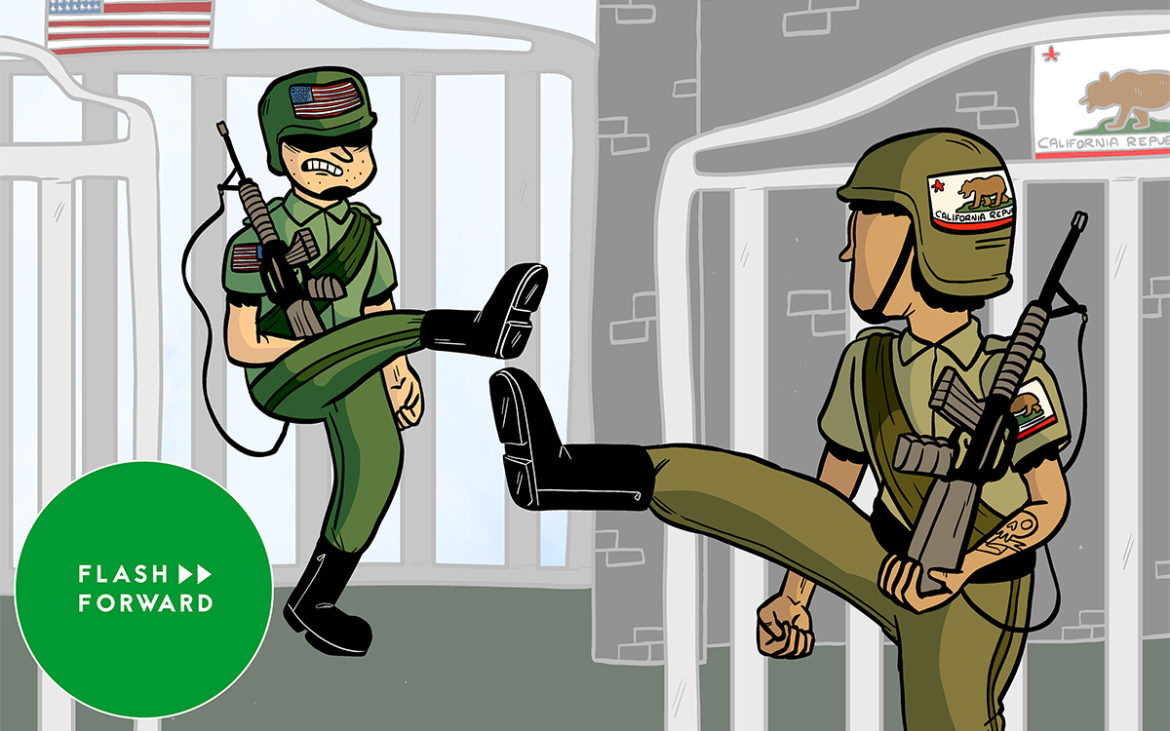
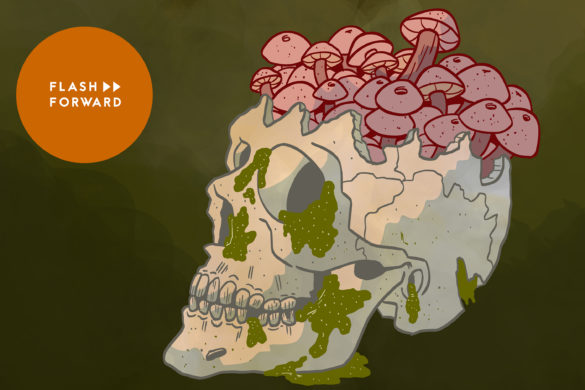
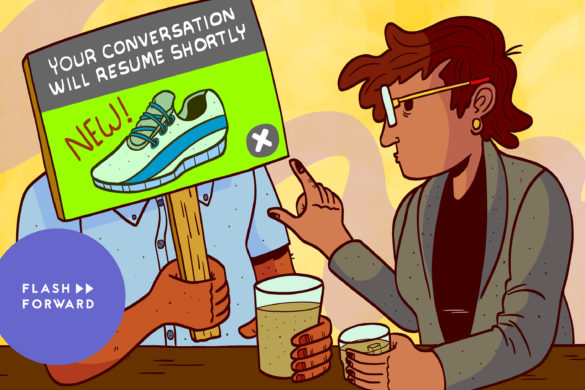
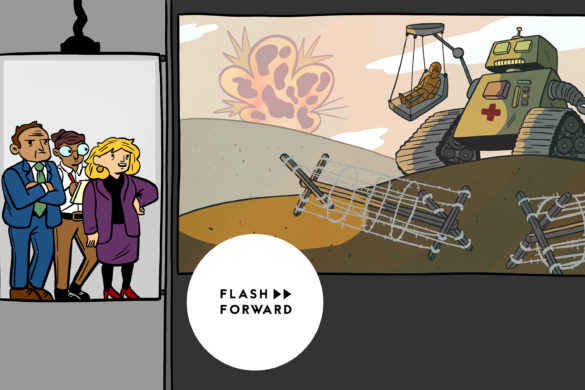
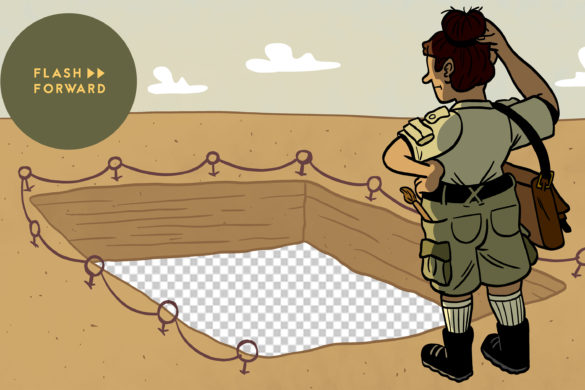
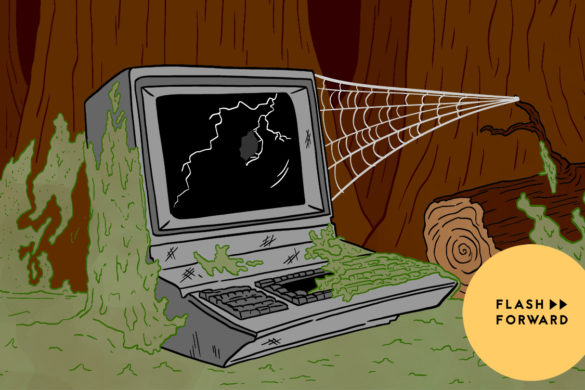
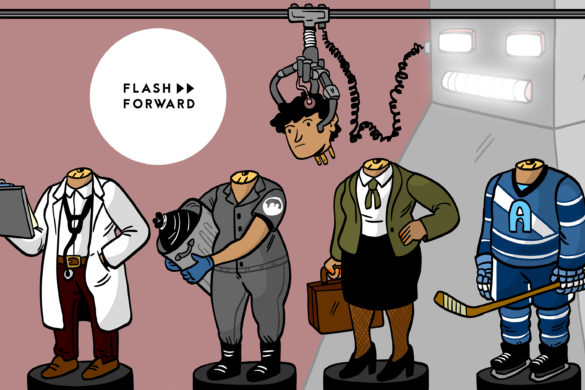
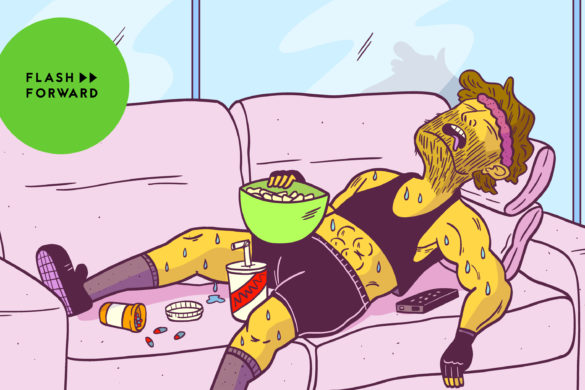
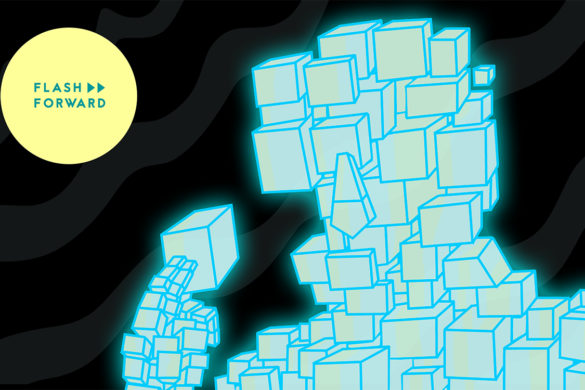
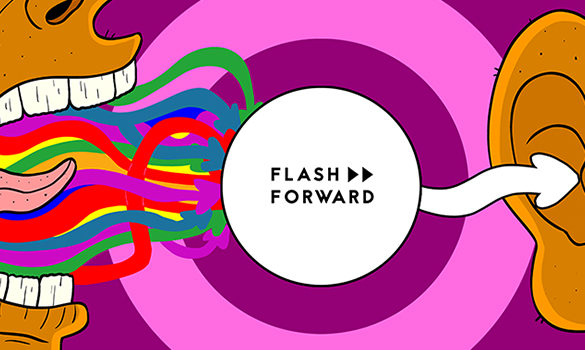

7 comments
Hey Rose,
something seems to have gone wrong – my android podcast client can’t download the episode, and my computer can’t play or download it either (chrome says no file when downloading).
Cheers and looking forward to the intriguing future
Alarion
All fixed now – maybe it was on my end, no idea. Thanks!
Hey, didn’t you recommend an other podcast in this episode? I looked for that part afterwards but couldnt find it, so it would be great if you could tell me which one it was..
It’s Science Vs! https://gimletmedia.com/science-vs/
Flash Forward is my favorite podcast in all of the space-time continuum. Rose, thank you so much for herculean efforts that bring fantastic results. You’ve invented a next iteration beyond the timeless elegance of a radio play, something that fits our cravings for both science fiction and science, as well as truly interesting tidbits that are just odd, and sprinkled throughout the narratives in just the right portions: if this were a restaurant, you deserve a Michelin star.
This episode about California felt like it skipped a couple beats.
The part about Prop 8, really really seemed like a red-herring. So much funding for the opposition to same-sex marriage poured in from *outside* California, in particular from Mormon, Roman Catholic, Orthodox Jewish, and a frankenstein agglomeration of Right Wing special interests. It was almost as if the US had held a presidential election and some other country, say like a Russia, jumped in to disrupt the politics of the people who were supposed to be voting. Not like that would ever happen in practice… Oh, by the way, California citizenry and elected state government worked to correct that Prop 8 extraterritoriality influence, through the federal courts. Done and done. Your narrative in this podcast seemed to cast a peculiarly “tin-foil hat” shade on the matter, along with a few top notes of East Coast disdain for the West.
As someone who’s part Native American (and on the other side, from a Muslim family), thanks for covering or at least introducing the horrible tangle of knots in the legal issues about sovereignty. BTW, one of the takeaways from the speaker in the episode — at least the quote that stuck out — was about how much more it might cost to buy cigarettes on a reservation if a state became its own country. That felt a wee bit condescending, given the gravity of issues you were covering.
So 20/20 hindsight is a dangerous thing, and of course please take this one listener’s comments with a huge boulder of salt, but there’s so so *much* more that you could have covered, minus the tin-foil hats. California is in action, right now, endeavoring against the federal government. The governor, the leaders for both legislative houses, the attorney general, and many of the mayors and police chiefs in our major cities are working to put legal checks in place so that we can protect our laws that protect air quality, public schools for our kiddos, benefits for the elderly, the rights of people who’ve immigrated or want to immigrate. That work has been in full force since before Inauguration Day, and California really truly wants to avoid the thrashings of autocratic ideologues in DC from destroying what civility we have here. Oh and by the way, that’s basically what the Right Wing-ish elements of the Texas state government did throughout the Obama administration, so there’s legal precedent at the federal level to use — without having to drag up survivalist militia in their 4WDs. Not secession, per se, though it is in outright “revolt” against the federal government. Case in point, the LA police chief refusing to divert officers from public safety to servicing feds’ demands for rounding up (brown-skinned) immigrants.
Back to the Prop 8 thing, here’s a suggestion for an episode. What if outside interests could influence elections in a reasonably reliable way? Gosh, the largest ad-tech company on Earth is also one of the premiere leaders in AI. What if in some near-future dystopia, controlling the sovereignty of people in another region were reduced to a matter of investment? Financialization and arbitrage on a grand scale, neatly handled through technology, social media, etc. like, with hedge funds that would effectively bet on taking over the elections of say other countries, selling off control to the highest bidders? Or for that matter, entire states in the US? It seems possible, no longer entirely illegal, and I could imagine a few large energy companies that would love to own entire countries in Africa or Asia. What if that happens as a social media post-democracy?
Hi Paco! Thanks for listening and writing such a thoughtful comment!
I may live in New York now but I was actually born and raised in California, and went to college there, and I’ll likely move back sooner than later! So I do love California. But I lived in Orange County and San Diego, and my family is from the Central Valley, so I grew up around conservatives. California on the whole skews left, that’s true, but what I was trying to point out is that in almost all the material I’ve read from California secessionists they paint this picture of a fully left utopia. Which erases whole lot of Californians!
As for your future, it’s an interesting idea! I think some would argue that that has already happened if not in the United States certainly in other countries. An interesting future to think about if it winds up spreading across the world! Rather than taking over countries by installing our hand picked leaders, what if the US took over countries using social engineering and algorithms? I like it!
Thanks again for listening!
[…] https://www.flashforwardpod.com/2017/03/07/california-dreaming/ […]